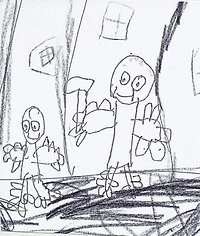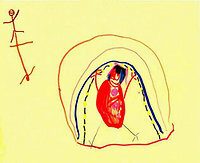Working with children and young people
When children and young people might need counselling
Many people believe that children are too young to talk about their difficulties, and can only express their feelings through play, but I have found this to be far from the case. In fact children as young as four or five can be very clear about how they are feeling, and what is bothering them, and I have found that talking about what is on their minds is a very effective way of working; in fact many young children express that they feel they need to talk to someone.
When members of the family are upset after a divorce or a death in the family, children and young people often mention that it is good to have the opportunity to talk to someone, as they don’t feel they can talk to their mum or Dad in case they upset them.
The great thing about working with children and young people, is that they grow and change quickly, so a difficulty that is worrying for children and parents may be short-lived in many cases, and experts report that if they receive appropriate support when a difficulty arises, it can avoid further difficulties in later life.
Life changes or events that might trigger difficulties:
Divorce of parents, especially if there is conflict
Death of family member, or friend
Illness in family, including depression
Traumatic events eg burglary, witnessing violence, being hurt themselves
Moving home, moving school
New baby
Other reasons for a parent living away
Specialising in techniques for children and young people; Jungian-Kalffian Sandplay, Picture tapping, and therapeutic drawing techniques
All of these techniques are particularly good for young people who are not so keen to talk in detail as they are creative, but highly effective as they tune in to the root of the difficulty in the deeper unconscious mind.
Specialising in areas of difficulty for children; anxiety, depression, bereavement, attachment (separation anxiety and fostering/adoption), sleep difficulties, low self esteem, difficulties with bullying, difficulties with behaviour.

Use of play therapy techniques; drawing, Sand-tray work and guided work

Although talking may form the main part of the work, I use a range a techniques, both to add interest to the work, and to provide a different way to engage. If for some reason, the child is not keen to talk, these techniques can form the main base of the work.
All play therapy techniques allow children to work through things that are on their minds, sometimes without them being aware of doing this, and by just discussing the drawing, or sand story for example, rather than the actual difficulty. This can feel safer for some children, and allows them to work more effectively
Free drawing, or guided drawing when a relevant idea is suggested and then explored
Children particularly enjoy sand tray work, which involves them choosing from a collection of small toys and models, and to use their imaginations to create a story in the sand. I encourage them to work through the story silently, as this allows them to become more involved, and at the end of a set time, they tell me a summary of the story. As in other play therapy, this allows them to work through things that are bothering them, in the same way that they might in a story or a dream; although they may not be aware of these themes, and these are not discussed.
Many of the areas I work with, with children and young people are:
Difficulties due to parental splits
Bereavement
Depression and low mood
Anxiety and separation anxiety
Anxiety and trauma following burglaries, witnessing incidents recently or in the past.
Self harm
Nightmares and getting to sleep
Eating and toileting difficulties
Angry outbursts, managing emotions
Difficult family relationships
Adjusting to step-parent
Parent-child
Sibling-sibling
Attachment difficulties , often particularly for looked after children
Adjusting to foster parent etc
Social or peer difficulties
Low self esteem, building resilience, need to be more assertive etc
Bullying
Helpful Links:
Association for Sandplay Therapy (AST) - www.sandplayassociation.com
Play therapy UK - www.playtherapy.org.uk
